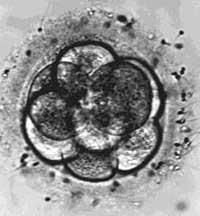Obtaining primates stem cells through parthenogenesis
Parthenogenesis consists of the formation of an adult being from an unfertilized egg. It is a typical form of reproduction of some invertebrates, which can occur occasionally in other plant and animal species. Thus, the newly created being will have the same genetic information as his mother, since there has been no parental involvement.

Currently, the process of obtaining mice cloned by parthenogenesis is common in the laboratory. However, so far it has not been possible to do with primates. However, Science magazine has announced that Advanced Cell Technology (ACT) has just overcome this challenge. And it has not been the only news that has published, as they have also announced that they have managed to form the kidney from the ear cell of a cow.
In fact, ACT researchers have obtained stem cells from the unfertilized oculum of a macaque. To excite the egg and force it to split, they have used a mixture of chemicals similar to sperm. They say that the obtained stem cells are intended to create tissues that replace the damaged tissues of patients, for example, healthy neurons that replace the neurons destroyed by Parkinson's disease.
However, although the fact that parthenogenesis has been performed with primates is a great achievement, it is still far from possible to cure diseases using techniques based on it. It seems, therefore, that the echo generated by similar news and real applications do not coincide. In addition, the question of the use of genetic engineering is not resolved at the moment. To know whether or not the objective of these investigations is met, we will still have to wait.
Buletina
Bidali zure helbide elektronikoa eta jaso asteroko buletina zure sarrera-ontzian











